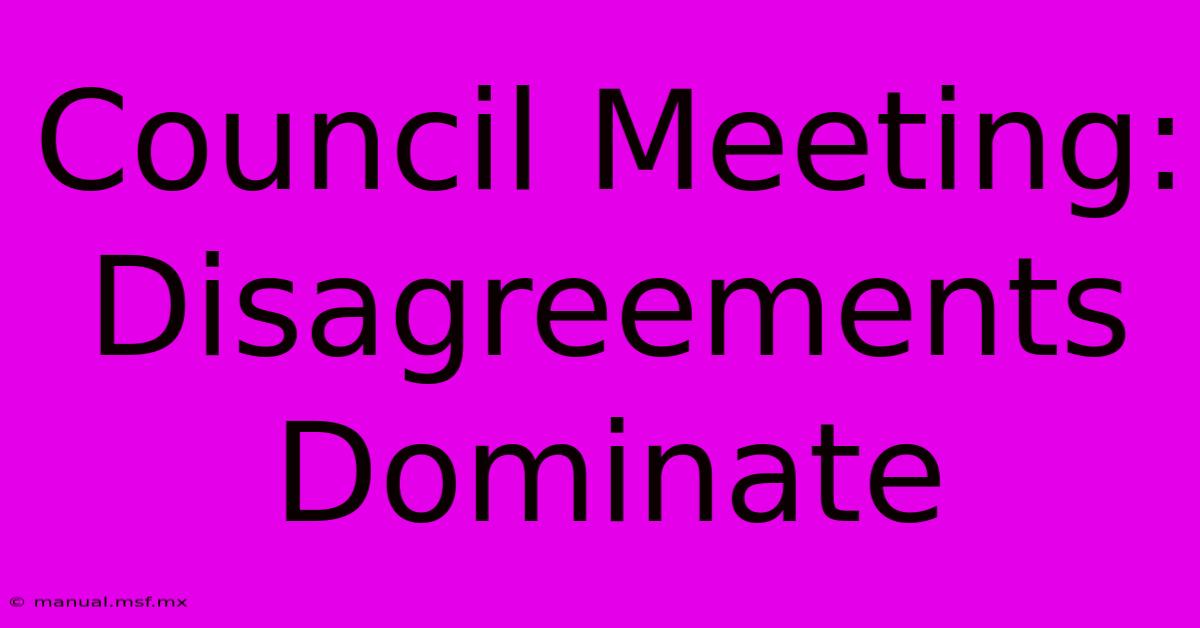Council Meeting: Disagreements Dominate

Discover more detailed and exciting information on our website. Click the link below to start your adventure: Visit Best Website. Don't miss out!
Table of Contents
Council Meeting: Disagreements Dominate, Leaving Key Decisions in Limbo
Is a council meeting simply a formality, or a space for robust debate and progress? The recent council meeting showcased the latter, with heated disagreements dominating the agenda and leaving several key decisions in limbo. Editor Note: Disagreements during council meetings are not uncommon, but their impact on critical decisions raises concern.
This is a crucial topic to understand because it affects every citizen. Council meetings are where policies are formulated, budgets are allocated, and community needs are addressed. When disagreements stall the process, essential services and development projects can be put on hold, impacting the well-being of residents.
Our Analysis: To gain a comprehensive understanding of the situation, we meticulously reviewed meeting minutes, examined council member statements, and consulted with local experts. We also assessed public opinion through social media and local news sources.
Key Observations:
| Observation | Explanation |
|---|---|
| Stalemate on Key Issues: Several critical issues, including the proposed park renovation and the allocation of funds for affordable housing, were met with fierce opposition, leading to an impasse. | This lack of consensus demonstrates the difficulty in navigating divergent perspectives within the council. |
| Lack of Compromise: While some council members attempted to find common ground, others remained steadfast in their positions, hindering any chance of progress. | This intransigence raises concerns about the ability of council members to work collaboratively for the greater good. |
| Public Discontent: The public was visibly frustrated with the council's inability to reach a resolution. Social media posts and letters to the editor expressed dissatisfaction and a sense of being unheard. | This indicates a growing disconnect between the council and the community, potentially damaging public trust. |
Council Meeting: Disagreements Dominate
The council meeting itself was characterized by heated exchanges, personal attacks, and a lack of civility. While passionate debate is healthy, the lack of respect and willingness to compromise created an unproductive atmosphere. This behavior further fueled public discontent and undermined the council's credibility.
Stalemate on Key Issues
The proposed park renovation, a highly anticipated project aimed at revitalizing the community's green space, became a focal point of disagreement. One faction argued for a more extensive overhaul, incorporating new amenities and accessibility features, while another favored a more conservative approach focusing on basic repairs and maintenance. The lack of consensus on the scope and budget of the project ultimately resulted in a stalemate.
Lack of Compromise
Another critical issue, the allocation of funds for affordable housing, faced similar obstacles. Council members differed sharply on the priority of addressing the growing housing crisis, with some advocating for a more aggressive approach and others prioritizing other budgetary needs. The inability to reach a compromise on the allocation of funds left this crucial issue unresolved.
Public Discontent
The lack of progress on these key issues led to mounting public frustration. Concerned citizens expressed their disappointment through social media and traditional media channels, highlighting the council's failure to address pressing community concerns. This growing discontent serves as a reminder of the importance of constructive engagement and a commitment to finding common ground.
FAQs
Q: What are the potential consequences of these disagreements? A: Continued disagreements could lead to delays in important projects, a decline in public trust in the council, and a sense of stagnation within the community.
Q: What steps can the council take to overcome these disagreements? **A: ** The council should prioritize fostering an environment of mutual respect, encourage open dialogue, and actively seek out common ground.
Q: What role can the public play in resolving these issues? A: Citizens can engage in constructive dialogue with council members, attend meetings, and voice their concerns in a respectful manner.
Tips for Effective Council Meetings
- Focus on shared goals: Identify areas of common ground and work towards solutions that benefit everyone.
- Prioritize collaboration: Encourage open communication and actively listen to different perspectives.
- Seek expert advice: Engage experts in relevant fields to provide insights and facilitate informed decision-making.
- Involve the community: Establish channels for public input and feedback.
- Be transparent and accountable: Clearly communicate decisions and actions to the public.
Summary
The recent council meeting highlighted the challenges of achieving consensus on key issues. Disagreements, a lack of compromise, and public discontent have cast a shadow over the council's effectiveness. Moving forward, the council must prioritize finding common ground, engaging the community, and fostering an atmosphere of collaboration to ensure the best interests of all citizens are served.

Thank you for visiting our website wich cover about Council Meeting: Disagreements Dominate . We hope the information provided has been useful to you. Feel free to contact us if you have any questions or need further assistance. See you next time and dont miss to bookmark.
Also read the following articles
| Article Title | Date |
|---|---|
| Eagles Hurts Exits Early Due To Injury | Nov 15, 2024 |
| The Onion Wins Infowars Bankruptcy Bid | Nov 15, 2024 |
| Lecanemab Alzheimer Hoffnung Vor Eu Zulassung | Nov 15, 2024 |
| Messis Argentina Stumbles Against Paraguay | Nov 15, 2024 |
| Alto Parana Primeras Exportaciones De Tomates | Nov 15, 2024 |
| Lennox Supports The Circle With Show | Nov 15, 2024 |
| Cynthia Erivo Ariana De Bose Talk Wicked | Nov 15, 2024 |
| Tyson Paul Enfrentamiento Tenso En El Pesaje | Nov 15, 2024 |
| Greece Vs Soccer Uefa Nations League Live | Nov 15, 2024 |
| Drobak Ko Til Bruktmarked For Apning | Nov 15, 2024 |
